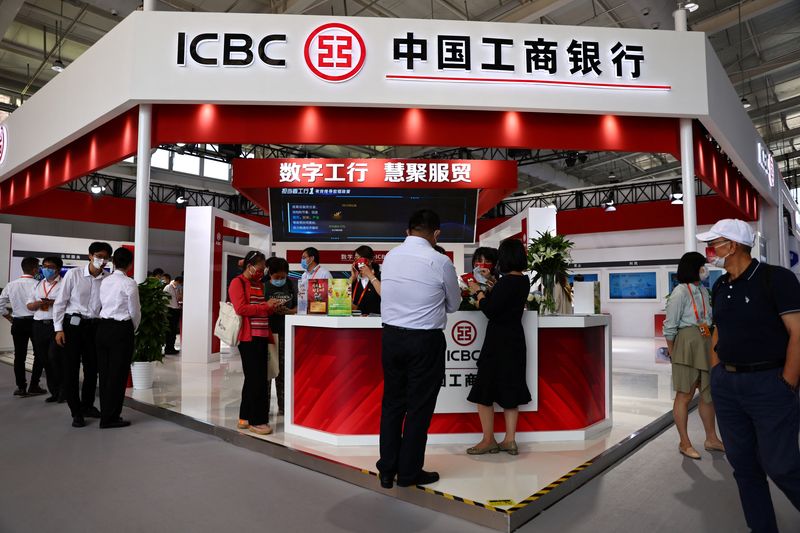By Ziyi Tang, Engen Tham and Selena Li
SHANGHAI/BEIJING (Reuters) - Four of China's five largest lenders reported a lower second-quarter profit this week after responding to a government nudge to lower lending rates in order to stimulate weak loan demand amid a slowing economy and struggling property sector.
Still, all five lenders announced interim dividends for the first time in more than a decade, in line with state-owned enterprises after the securities regulator last year called for a boost to investor returns as stock markets fluctuated.
China since last year has rolled out a string of property stimulus measures and cut benchmark lending rates and mortgage rates to boost growth in the world's second-largest economy. The nation is verging on deflation and faces a prolonged property crisis, surging debt and weak consumer and business sentiment.
Industrial and Commercial Bank of China Ltd (ICBC), the world's largest lender by assets, and China Construction Bank (OTC:CICHF) Corp (CCB) reported a 0.8% drop and 1.4% fall in second-quarter net profit respectively on Friday.
Bank of China and the Bank of Communications (BoCom) also posted lower profits in the second quarter earlier this week although AgBank bucked the trend with a 14.2% increase on Friday.
ICBC's net interest margin (NIM) - a key gauge of profitability - narrowed to 1.43% at the end of June from 1.48% three months earlier, while CCB's was also lower.
Although the other three banks reported a stable margin or slight widening, the pressure on NIM is unlikely to let up.
"We forecast further pressure on NIM in the second half of 2024, driven by mortgage repricing and government directives to lower borrowing costs to support the economy," said Vivian Xue, a director at Asia-Pacific Financial Institutions, Fitch Ratings.
Higher dividend payouts will add to the squeeze on lenders' profits from weak loan demand and lower lending yields.
"Reducing the dividend payout ratio to alleviate capital pressure has never been one of our policy options," He Zhaobin, board secretary of BoCom, said at a post-earnings press conference on Wednesday.
The bank said it would make interim cash payment of 0.182 yuan a share, totaling 13.52 billion yuan ($1.91 billion), which is expected to be distributed early next year.
PROPERTY WEIGHS
While some banks warned of rising bad loans in the property sector, others intend to increase lending despite a wider fall in demand for mortgages.
BoC vice president Liu Jin said on Friday that the bank plans to increase mortgage lending and consumer loans.
Residential mortgages decreased to 17% of the Chinese banking sector's total loans by end-2023, from 21% two years earlier, according to Fitch.
Meanwhile, BoCom said it expects more bad debt from developers.
"Although banks' direct exposure to property developers only accounts for a small proportion of their loan books, the prolonged downturn in the property sector has maintained the risk of contagion on upstream and downstream sectors," said Nicholas Zhu, a banking analyst at Moody's (NYSE:MCO).

For the big five, non-performing loan ratios remained largely stable or tipped marginally down.
($1 = 7.0886 Chinese yuan renminbi)